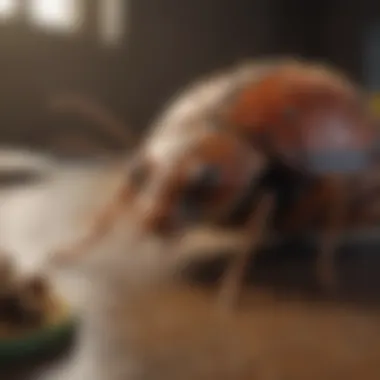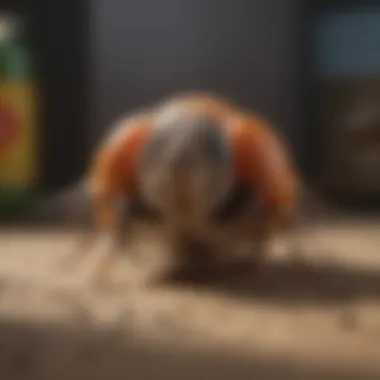Understanding McDonald Exterminators: Pest Control Insights


Intro
Pest control is an essential aspect of maintaining a safe and healthy living environment. Within this domain, McDonald exterminators emerge as key players. Their methods and practices significantly influence how households manage pest-related problems. Understanding these exterminators' strategies can empower homeowners to make informed choices regarding pest management.
The relevance of pest control extends beyond mere eradication; it touches upon public health, property maintenance, and economic impacts. An informed approach includes recognizing common pests, preventive measures, and treatment options. This article will guide you through these topics, providing insight into the practices employed by McDonald exterminators.
Prelims to Pest Control
Pest control is a critical issue that affects homes, businesses, and entire communities. Understanding this topic is essential, especially for homeowners who seek to protect their environments from unwanted pests. Knowledge about pest control can lead to more informed decisions about prevention and treatment strategies. This segment will clarify the fundamental aspects of pest control and its historical context, setting the stage for deeper exploration into specific pest management practices.
Defining Pest Control
Pest control refers to the methods employed to manage, reduce, or eliminate pest populations. Pests can include insects, rodents, and even larger animals. The clarity in defining pest control helps homeowners understand the various techniques available to tackle pest-related issues effectively.
Pest control encompasses a range of strategies:
- Prevention: Keeping pests from becoming a problem in the first place.
- Monitoring: Regularly checking for pest presence.
- Management: Implementing measures when pests are detected.
In this context, pest control is not merely about extermination. It involves a comprehensive approach that includes inspection, assessment, and continuous management, making it crucial for maintaining a safe and healthy living space.
History of Extermination Practices
The history of extermination practices reveals a progression from ancient methods to modern techniques. Dating back to ancient civilizations, various methods have been employed to combat pest infestations. For instance, Egyptians used cats to control rodent populations, while the Chinese developed natural repellents derived from plants.
As time passed, the introduction of synthetic pesticides in the 20th century revolutionized pest management. These chemical solutions offered efficiency but also raised concerns about health and environmental impacts. In response to these concerns, Integrated Pest Management (IPM) strategies emerged, blending biological and chemical methods.
"Understanding the evolving history of pest control practices provides valuable insights into why certain methods are favored today."
This historical perspective gives homeowners an appreciation of current pest control practices and emphasizes the importance of using environmentally friendly strategies where possible.
Overview of McDonald Exterminators
Understanding the role of McDonald Exterminators within the pest control industry is crucial for both homeowners and professionals alike. This overview highlights their specialized services, methodologies, and expertise that distinguish them from other providers. With pest infestations becoming increasingly common, the demand for reliable and effective extermination services has risen. McDonald Exterminators aims to meet this demand by offering tailored solutions that address individual pest problems effectively.
Service Offerings
McDonald Exterminators provides a broad range of services to cater to various pest control needs. These services include:
- Residential Pest Control: This service focuses on treating homes for common pests such as ants, cockroaches, and rodents. It aims to eliminate existing pests while preventing future invasions.
- Commercial Pest Management: Businesses often face unique pest problems. McDonald Exterminators offers solutions designed to protect commercial properties, ensuring a pest-free environment for customers and employees.
- Termite Control: Termites can cause significant structural damage if left unchecked. McDonald Exterminators utilizes advanced techniques to detect and eliminate termite infestations, safeguarding buildings from costly repairs.
- Bed Bug Treatments: Bed bugs are notoriously difficult to eradicate. Their specialized treatment plans ensure thorough removal and help prevent future infestations.
- Eco-Friendly Solutions: Recognizing the growing concern for the environment, McDonald Exterminators provides eco-friendly pest control options. These treatments are effective yet minimize harm to non-target species and the ecosystem.
Each service is meticulously designed to address specific issues while considering client needs and environmental factors, thus ensuring high levels of customer satisfaction.
Areas of Expertise
McDonald Exterminators demonstrates expertise across various pest types and control methods. They are not limited to a few common pests but extend their knowledge to a broader spectrum, ensuring comprehensive pest management. Their areas of expertise include:
- Insect Control: From ants to spiders, the team is knowledgeable about various insect species, their behaviors, and effective control measures suitable for each.
- Rodent Management: Rodents can carry diseases and damage property. McDonald Exterminators implements effective rodent control strategies that include trapping and exclusion techniques.
- Termite Assessment and Treatment: Their specialists are trained to assess termite damage accurately and apply targeted treatments to mitigate risks to properties.
- Pest Prevention: Educating clients on preventive measures is also part of their expertise. Clients receive practical recommendations and tips, helping them maintain a pest-free environment long-term.
Effective pest management requires a thorough understanding of pest behavior, environmental factors, and the latest control techniques.
This diverse area of expertise allows McDonald Exterminators to adapt to changing pest dynamics and develop strategies that are both efficient and sustainable.
Common Pests Addressed
Understanding the common pests targeted by McDonald Exterminators is crucial for homeowners. Each pest poses unique challenges and threats to residential properties. Effective management strategies depend on recognizing the specific characteristics and behavior of these pests. This section delves into the major pests that homeowners often contend with, emphasizing their potential damage and the necessity for prompt extermination.
Bed Bugs
Bed bugs are notorious for their ability to invade homes stealthily. These small, reddish-brown insects feed on human blood, causing itchy bites. Moreover, they reproduce rapidly, which can lead to widespread infestations in a short time. The psychological impact on homeowners can be significant, as the presence of bed bugs can lead to insomnia and anxiety.


McDonald Exterminators employ thorough inspection methods to detect these pests. Treatment often involves the use of heat and specialized insecticides to eliminate all life stages of bed bugs.
Termites
Termites are among the most destructive pests for any home. They feed on wood and can compromise the structural integrity of a house. A significant factor to note is that termite damage often occurs silently over time, making early detection difficult. Homeowners need to be proactive in seeking inspections, especially in areas with a high risk of termite activity.
McDonald Exterminators utilize baiting systems and liquid treatments to effectively manage termite populations. Their long-term prevention strategies involve regular inspections and maintenance to ensure no new infestations arise.
Rodents
Rodents, such as mice and rats, are common nuisances. They can contaminate food supplies and cause property damage by chewing through wires and insulation. Their presence can also pose health risks, as they are carriers of various diseases. Effective rodent control begins with identifying entry points and removing potential food sources.
McDonald Exterminators offer a combination of trapping and exclusion techniques to manage rodent populations. This includes sealing cracks and gaps in walls to prevent future intrusions.
Ants
Ants are social insects that can invade homes in search of food. While some species are merely a nuisance, others can cause damage or spread disease. For example, carpenter ants can compromise wooden structures, similar to termites. This makes it necessary for homeowners to identify the type of ant infiltrating their home for effective management.
McDonald Exterminators devise targeted strategies depending on the ant species. Treatment may involve baiting, which attracts ants to a poisoned food source, ultimately eliminating the colony. Awareness and prompt action are essential when addressing ant infestations.
Understanding these common pests is vital for homeowners. Each pest has specific behaviors and impacts that necessitate targeted approaches for effective control.
By addressing these pests comprehensively, McDonald Exterminators can help restore safety and comfort in homes.
Science Behind Pest Control
The topic of science behind pest control is crucial in understanding how extermination services operate. This section focuses on effective strategies that McDonald Exterminators employs. Knowledge of pest behavior, biology, and ecology empowers pest control professionals to devise methods that are both effective and environmentally sound. This triangulation of knowledge leads to better outcomes not just for the exterminators but also for the clients they serve.
Biological Control Methods
Biological control methods involve the use of natural predators or parasites to manage pest populations. This strategy respects the balance of the ecosystem while ensuring pest reduction. For example, introducing ladybugs can help control aphid populations. Other common applications include the use of nematodes to target soil pests. The advantages of biological control include:
- Sustainability: It reduces reliance on chemical treatments.
- Environmental Safety: There is less risk of harming beneficial organisms.
- Cost-Effectiveness: Over time, it can be cheaper than repeated chemical applications.
Despite these advantages, biological methods can take time to show results, which may not be ideal for immediate infestations.
Chemical Control Methods
Chemical control methods are often the first approach that comes to mind when discussing pest extermination. These involve the use of pesticides. Important types include insecticides, fungicides, and herbicides. While these can quickly manage a pest problem, their use requires caution. Over-reliance on chemicals can lead to pesticide resistance among pests and potential health concerns for humans and pets. Key considerations include:
- Application Timing: Applying at the right moments maximizes effectiveness.
- Targeted Products: Carefully choosing pesticides that are specific to certain pests minimizes risk to non-target organisms.
When employed judiciously, chemical methods can provide rapid relief from pests while allowing for longer-term strategies to take effect.
Integrated Pest Management
Integrated Pest Management (IPM) is a holistic approach that combines various strategies to manage pest populations effectively. This method utilizes a blend of biological, chemical, cultural, and mechanical tactics. IPM focuses on long-term prevention and manages pest populations below an economically significant level. The principles of IPM include:
- Regular Monitoring: Frequent inspections help in identifying pest presence early.
- Threshold Levels: Understanding the point at which pests become a problem helps in deciding when to act.
- Combining Methods: Utilizing multiple strategies can enhance effectiveness and reduce drawbacks associated with single-method approaches.
Overall, IPM promotes a more sustainable relationship with the environment and is a philosophy that McDonald Exterminators embodies in their approach to pest control.
Economic Impact of Pest Infestations
Pest infestations can have a significant economic impact on homes, businesses, and the community as a whole. Understanding these costs helps homeowners and business owners recognize the value of addressing pest issues proactively. The economic perspective also highlights how infestations can ripple through various sectors, impacting property value and overall quality of life.
Specific Elements of Economic Impact
An infestation often leads to direct and indirect costs. Direct costs include the price of pest control services, which can vary widely based on the pest type and infestation severity. For instance, termite treatments can be particularly expensive due to the structural damage these pests can cause.
Indirect costs can include property depreciation, loss of business income in commercial settings, and increased healthcare expenses related to pest bites or diseases. Furthermore, the psychological stress associated with pest infestations contributes as individuals may experience anxiety, sleep disturbances, and even decreased productivity at work or home.
Cost Analysis of Treatments


The cost of pest control treatments can range based on several factors, including the type of pest and size of the area being treated. Here’s a quick breakdown of average costs:
- Rodent Extermination: $100 - $500
- Bed Bug Treatments: $300 - $2,000
- Termite Treatments: $500 - $3,000
The price may increase with the frequency of treatments needed or if follow-up inspections are necessary. These costs can seem daunting, but they need to be viewed in the context of potential property damage and health issues that untreated infestations can cause.
"Investing in pest control not only addresses immediate problems but also safeguards long-term assets."
Homeowners should prioritize thorough quotes from multiple pest control services. This ensures they receive a fair estimate based on actual conditions rather than generic prices.
Long-Term Financial Implications
Ignoring pest infestations can lead to severe financial consequences. The damage caused by pests like termites can compromise the structural integrity of homes, leading to expensive repairs. For homeowners, this might mean not only forking out large sums for immediate repairs but also facing a decrease in property value that might take years to recover.
In a business setting, pest control issues can deter customers. If businesses are unable to maintain a pest-free environment, they risk losing clientele, which means declining revenue.
Moreover, states and municipalities may enforce expensive remediation measures when infestations are reported. This type of regulation can add another layer of financial burden. Understanding long-term implications thus highlights the necessity for preventive measures such as routine inspections and treatments.
Prevention Strategies
Preventing pest infestations is a crucial aspect of maintaining a safe and comfortable living environment. Effective prevention strategies not only reduce the likelihood of infestations but also minimize the need for intervention from pest control professionals like McDonald Exterminators. Moreover, understanding these strategies enables homeowners to take proactive measures, therefore avoiding potential costs and complications associated with pest issues.
Adopting a comprehensive approach to prevention involves multiple elements, each contributing to a holistic strategy. Here, we outline critical aspects that homeowners should consider when implementing their pest prevention plans.
Homeowner Best Practices
Homeowners can implement various best practices to deter pests. Here are some recommendations:
- Regular Cleaning: Keep your home tidy. Regularly clean kitchen surfaces and dining areas. Remove food crumbs and spills to eliminate food sources for pests.
- Seal Entry Points: Inspect your home for gaps and cracks. Seal these openings to prevent insects and rodents from entering. Pay attention to areas around windows, doors, and pipes.
- Proper Waste Management: Utilize sealed bins for trash. Dispose of garbage regularly. This practice minimizes odors that attract pests.
- Outdoor Maintenance: Trim vegetation away from your home. Overgrown shrubs and trees can provide pathways for pests. Maintain a clean yard to deter unwanted visitors.
- Moisture Control: Address any leaks or damp areas. Pests like termites and cockroaches thrive in moist environments. Keeping your home dry is vital for prevention.
Sharing these practices among family members ensures everyone takes part in pest prevention efforts.
Seasonal Considerations
Monitoring seasonal changes is essential in pest management. Pests often exhibit different behavior based on the time of year. For instance, certain insects become more prominent during warmer months, while others may seek shelter indoors during colder weather. Here are key seasonal considerations:
- Springtime: This season marks the beginning of pest activity. Residents should check for signs of insects emerging from hibernation. Common pests like ants and termites become active during this period, so preventive measures should ramp up.
- Summer: High temperatures often lead to increases in pests such as mosquitoes and flies. Homeowners should ensure standing water is removed from yards and consider installing screens on windows.
- Autumn: As temperatures drop, pests like rodents and spiders look for warmth inside homes. Sealing entry points becomes crucial during this time to deter them from entering.
- Winter: Though some pests become dormant, others may find warmth inside homes. Regular inspections for droppings or signs of infestations should be part of winter maintenance.
By acknowledging the seasonal patterns, homeowners can adapt their preventive strategies to effectively manage pest-related issues.
A proactive approach to pest prevention can save homeowners significant time and money in the long run.
Qualifications of Pest Control Professionals
The qualifications of pest control professionals are a crucial aspect of effective pest management. Proper training and certifications ensure that exterminators possess the necessary knowledge and skills to deal with various pest-related issues. This not only enhances their effectiveness in the field but also builds trust with clients seeking pest control services.
One primary benefit of engaging qualified professionals is safety. Pest control often involves the use of chemical treatments that may pose health risks if not handled correctly. A certified exterminator understands the proper application and safety measures associated with pesticide use, which helps protect the client’s home and their family's well-being.
Furthermore, well-qualified pest control experts can accurately identify different types of pests and assess the extent of an infestation. This assessment is critical for developing an appropriate treatment plan. Their education equips them with an understanding of pest biology and behavior, allowing for tailored solutions rather than one-size-fits-all approaches. Therefore, the significance of these qualifications cannot be overstated, as they directly impact the effectiveness of pest control efforts.
Required Certifications
Pest control professionals typically need specific certifications to operate legally and effectively. In many regions, they must pass examinations that demonstrate their understanding of pesticide application, safety, and pest biology. For example, professionals often acquire a pesticide applicator license, which may require completion of training courses covering regulatory requirements and safe handling practices.
Certifications can vary by state and may include:
- General Pest Control Certification: This license allows professionals to manage a broad spectrum of pest problems.
- Termite Control Certification: Specialized training on the treatment and prevention of termite infestations.
- Integrated Pest Management (IPM) Certification: Focuses on sustainable and environmentally friendly pest control strategies.
Acquiring these certifications reflects a commitment to professionalism and best practices in the pest control industry. It provides clients with confidence that they are entrusting their homes to knowledgeable individuals who adhere to regulatory standards.
Continued Education Importance


The pest control industry is always evolving. New methods, technologies, and regulations emerge, underscoring the importance of continued education for pest control professionals. Ongoing training helps exterminators stay updated on effective pest management techniques, ensuring they deliver the best service possible.
Continued education may involve:
- Workshops and Seminars: Learning about recent advancements in pest control technologies.
- Online Courses: Flexible training options to keep knowledge current.
- Industry Conferences: Networking with other professionals and sharing insights.
By pursuing continued education, professionals demonstrate their dedication to high standards in their field. This effort not only enhances their career prospects but also benefits homeowners as they receive progressive solutions to pest challenges. In a rapidly changing environment, well-informed exterminators are better equipped to adapt to emerging pest trends and client needs.
Debunking Common Myths
Pest control remains a subject riddled with misunderstandings. Misconceptions can lead homeowners to make poor decisions regarding pest management. Understanding these myths is crucial for anyone interested in maintaining a pest-free environment. Addressing these myths not only clarifies facts but also aids in effective integration of pest control methodologies. Having accurate information empowers homeowners to make educated choices for their properties, ensuring better outcomes with their pest management strategies.
Understanding Extermination Techniques
Extermination techniques vary based on the pest being targeted. Many believe that all extermination methods are harmful or radical; however, this is not entirely true. Modern pest control professionals, like McDonald Exterminators, utilize a range of techniques tailored to the specific pest issue at hand. Here are some common techniques:
- Chemical Treatments: These involve the use of pesticides designed to eliminate pests effectively. When used correctly by professionals, these chemicals pose minimal risk to humans and pets.
- Physical Barriers: Sealing entry points and creating physical obstructions can prevent pests from accessing homes. This is an approachable strategy often overlooked by homeowners.
- Biological Control: This method employs natural predators to manage pest populations, offering a more eco-friendly solution.
Many homeowners hesitate to call for entrenched pest issues due to fears about the treatment process. Understanding effective, safe extermination techniques can help dispel these fears.
Misconceptions about Pesticides
One major myth surrounding pest management is the fear of pesticides. It is often assumed all pesticides are harmful. In reality, pesticides are regulated and, when used correctly, are safe for residential use. It is important to note these key points:
- Not All Pesticides Are the Same: Different classes of pesticides serve different purposes. Some are specifically designed for minimal residual impact.
- Application Matters: The timing, method, and dosage of pesticide application significantly influence safety and effectiveness. Trained professionals can ensure proper application.
- Environmental Considerations: Products today are more eco-friendly due to evolving regulations. Many options now contain lower risk profiles, making them safer for both residential use and the environment.
Understanding these misconceptions can significantly impact how homeowners perceive pest management and treatment.
By clarifying these myths, McDonald Exterminators helps to foster a knowledgeable client base that can make informed decisions regarding pest control.
Client Relations in Extermination
Client relations play a crucial role in the pest control process. McDonald Exterminators understand that effective communication and rapport with clients enhance service delivery. This section delves into how fostering a strong relationship with clients benefits both parties in the pest management realm.
Customer Education
Educating customers about pest control is vital. McDonald Exterminators prioritize informing clients on various aspects of pest management. Knowledge empowers homeowners to understand pest behavior, prevention techniques, and treatment options. Through clear and accessible information, clients can make better decisions regarding pest control methods.
- Understanding Treatment Options: Customers should know about different pest control methods available, including biological, chemical, and integrated pest management approaches.
- Pest Behavior Insights: By explaining how specific pests behave, such as their nesting patterns or feeding habits, homeowners can identify problems early.
- Safety Measures: Informing clients about safety protocols related to pest control services reassures them about their family’s health and well-being.
Educating customers creates a more informed client base that actively participates in pest management.
Building Trust Through Transparency
Transparency is essential for establishing trust with clients. McDonald Exterminators strive to practice openness at every stage of their service. Clients want to feel secure and confident in the pest control solutions provided.
- Clear Communicatoin of Processes: It is important to outline what clients can expect during the extermination process. This includes discussing treatment methods, timelines, and possible outcomes. Clients should never feel kept in the dark about procedures.
- Honesty in Pricing: Providing clear and honest pricing eliminates surprises. Detailed quotes and service plans build trust and allow homeowners to budget effectively for pest control services.
- Feedback Mechanism: Encouraging client feedback fosters a two-way communication channel. Addressing concerns swiftly can lead to improvements in service and demonstrates a commitment to client satisfaction.
"Successful client relations are built on trust, education, and transparency. By prioritizing these elements, McDonald Exterminators not only enhance their service delivery but also foster lasting relationships with their clientele."
The End: The Role of McDonald Exterminators in Pest Management
The importance of McDonald Exterminators in pest management cannot be overstated. Their systematic approaches offer homeowners effective solutions to tackle pest invasions. In this article, we emphasized how choosing professional extermination services provides not only immediate relief but also long-term strategies for prevention and control. McDonald Exterminators exemplify what is necessary in today’s world of pest management, merging science with practical skill.
Future Trends in Pest Control
Looking ahead, the pest control industry will likely embrace several future trends. One key trend is the increased adoption of technology. Companies like McDonald Exterminators are exploring advanced tools such as thermal imaging and drones. These technologies will aid in precise pest detection and treatment, ensuring fewer chemicals are used.
Consumer awareness also continues to rise. Homeowners are seeking eco-friendly pest control services, pushing companies to innovate. For example, integrated pest management (IPM) focuses on minimizing chemical use while maximizing effectiveness. This approach aligns with environmental protection goals and is likely to become standard practice.
A Call for Sustainable Practices
Sustainability in pest management is essential for future generations. McDonald Exterminators, like many others, are now focusing on sustainable practices. This includes using biodegradable and less toxic substances for pest control. By reducing the reliance on harmful chemicals, the goal is to protect not only homes but also ecosystems.
Homeowners are encouraged to engage in sustainable practices as well. Simple measures, like maintaining cleanliness and sealing entry points, enhance pest prevention.
Effective pest control is not just about extermination. It is about understanding the ecosystem dynamics and creating a sustainable balance.



